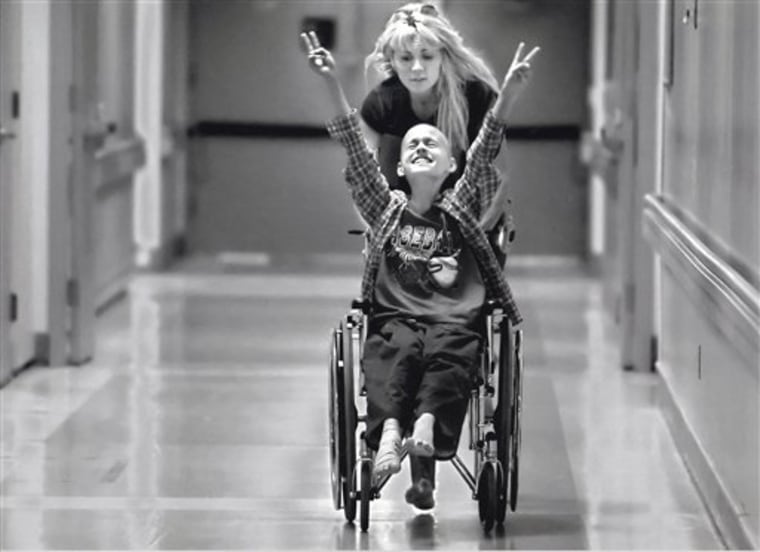The Wall Street Journal won two Pulitzer Prizes on Monday, including the public service award for its coverage of the stock-options scandal that rattled corporate America in 2006. The Associated Press captured one for breaking news photography for a picture of a Jewish woman defying Israeli security forces in the West Bank.
The Journal, the only multiple winner this year, also won in international reporting for its coverage of how capitalism is emerging in China.
The staff of The (Portland) Oregonian won for breaking news for its reporting on a California family that disappeared in the mountains during a blizzard. James Kim and his family took a wrong turn while returning home to San Francisco following a Thanksgiving trip. Kim was found dead of exposure after his wife and two young daughters were rescued. The judges praised the newspaper for its “skillful and tenacious coverage ... telling the tragic story both in print and online.”
“Our thoughts today are with the Kim family, for, as our reporting showed, this is a tragic accident that might have been avoided,” Executive Editor Peter Bhatia said.
Kenneth R. Weiss, Usha Lee McFarling and Rick Loomis of the Los Angeles Times won for explanatory reporting for their reports on the world’s distressed oceans. The judges also praised their print and online stories.
Brett Blackledge of The Birmingham (Ala.) News won for investigative reporting for his exposure of cronyism and corruption in the state’s two-year college system. The stories resulted in the dismissal of the chancellor and other corrective action, the Pulitzer Board noted. The stories were also a finalist in the public service category, but were moved to investigative reporting by the board.
‘Creative and comprehensive probe’
In awarding the public service prize to the Journal, the judges cited its “creative and comprehensive probe into backdated stock options of business executives that triggered investigations, the ouster of top officials and widespread change in corporate America.”
The other finalist for public service was The Washington Post for its examination of waste and abuse in the nation’s farm subsidy system.
Charlie Savage of The Boston Globe won for national reporting for his revelations that President Bush often used “signing statements” to assert his controversial right to bypass provisions of new laws.
“This is a great honor, and I view it as a great moment not just for myself but for the Globe as an institution,” Savage told The Associated Press. “The Globe for a while was throwing it out on the front page when a lot of people were ignoring it, and that took a lot of courage.”
Debbie Cenziper of The Miami Herald was honored for local reporting for reports on waste, favoritism and lack of oversight at the Miami housing agency.
An imam serving the faithful in AmericaAndrea Elliott of The New York Times won for feature writing for coverage of an immigrant imam striving to serve his faithful in America.
The Daily News of New York was honored for editorial writing for its editorials on behalf of Ground Zero workers.
Cynthia Tucker of The Atlanta Journal-Constitution won for commentary.
Newsday’s Walt Handelsman was honored for editorial cartooning.
Jonathan Gold of LA Weekly was cited for criticism for his restaurant reviews.
The AP’s Oded Balilty won for breaking news photography for his image of a lone Jewish woman defying Israeli security forces as they remove illegal settlers in the West Bank. It was the AP’s 49th Pulitzer and the 30th awarded for photos.
“It is a stunning single image that captures the chaos and emotion of that evacuation,” AP Executive Editor Kathleen Carroll said in a message to the staff.
The AP’s package of images of the war between Israel and Hezbollah was a finalist in the category. That entry included photos by Balilty.
“Their success in the breaking-news photo category enhances the truly spectacular and enduring contribution made by AP photojournalists over decades,” AP President and CEO Tom Curley said in a statement. “They have added to an unrivaled collection of iconic images displayed on front pages and newscasts that have become forever etched in public consciousness. Their work once again demonstrates the importance of APs mission and commitment by brave front-line journalists worldwide. “
Portrait of a single mother and dying son

Renee C. Byer of The Sacramento (Calif.) Bee was honored for feature photography for her portrayal of a single mother and her young son as he loses his battle with cancer.
In addition, the board gave special recognition to Iranian photographer Jahangir Razmi, whose 1979 picture of a firing squad in his native country won the 1980 Pulitzer for spot news photography. He remained anonymous until a Wall Street Journal reporter unmasked his identity in a December article.
Winners in every category except for public service receive a $10,000 cash award and a certificate. The public service winner is awarded a gold medal.
Slideshow 26 photos
Celebrity Sightings
Online material was allowed to be part of all entries for the first time last year, but was restricted in all but one category to written stories or still images. This year, newspapers were able to submit online material like video, blogs, databases and interactive graphics for all print categories. The Public Service category has allowed material such as streaming video and databases since 1999.
The awards are given by Columbia University on the recommendation of the 18-member Pulitzer board.
The board this year replaced the beat reporting category with a local reporting category.
The Pulitzers were created under the terms of the will of newspaper publisher Joseph Pulitzer, who died in 1911. He endowed the journalism school at Columbia, and dictated that money be set aside for the prizes. The first awards were handed out in 1917.
